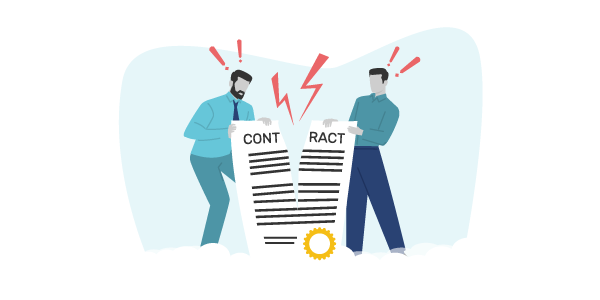To Cancel or Not? A Guide for Staffing Firms
November 26, 2024

When you’re looking to cut costs, insurance often feels like an easy place to start—especially if you don’t feel like you really need it. Maybe you’re confident in your client relationships and the chances of a lawsuit feel slim. Or maybe you only needed coverage to meet contractual requirements, so canceling after the project wraps up seems harmless. After all, you can always buy a new policy if you need it, right?

In many industries, like Staffing & Recruitment, many businesses do just that: secure insurance to meet client demands, only to cancel it or let it expire once the contract ends. But here’s the risk: once your policy ends, gaps in coverage open up, leaving you unprotected if a claim arises—even for work you did while insured. Without an active policy in place, any damages are on you, out-of-pocket.
Thinking of repurchasing later on? It’s not always so simple—and it might even cost more. Before dropping a policy, here’s what’s at stake for Staffing & Recruitment firms.
What’s a gap in coverage?
A gap or lapse in coverage occurs when there’s a period between your insurance policies, specifically, the time between when one policy ends and when your new policy takes effect. For example, say you had a policy from January 1, 2022 to January 1, 2023, and then cancelled your coverage and didn’t purchase a new policy until January 1, 2024. The entire 2023 year would count as a gap in coverage.
Aside from cancellation, gaps in coverage can occur if you’ve failed to renew your policy on time and allowed it to expire or lapse, missed a payment, or switched providers. In contrast, maintaining your coverage without interruption is known as continuous coverage. Whether you have insurance for your business, or yourself as a working professional, it’s critical to have continuous coverage and avoid gaps in protection that could leave you exposed.
Why should I avoid gaps in coverage?
1. You’ll be unprotected.
A gap in coverage could result in no coverage at all. That’s because many types of insurance, like Professional Liability Insurance, operate on a claims-made-and-reported basis. Your policy will only apply to claims that are both brought to light, or “made,” against you AND “reported” to the insurance company during the policy term.
In other words, claims that arise after your policy’s cancellation or expiry won’t be covered—even if you had insurance when the event giving rise to the claim occurred. If you cancel your policy for any reason and you’re sued for a project or a placement from before your cancellation date, you won’t be covered under your old, now expired, policy.
What’s the problem? You can be sued for past work YEARS later, long after the alleged incident took place. But if you don’t have an active policy when the claim is reported, you’ll have to pay for the legal costs, settlements, and damages out-of-pocket. If your policy covers candidates on assignment, they could also be left exposed if named in a lawsuit related to actions taken while working on behalf of your staffing company. This is a huge risk for anyone that’s going on a leave of absence, retiring, closing their business, and regularly cancelling and repurchasing insurance for short-term needs.
If you re-apply for coverage later on, keep in mind: a new policy will only cover claims and incidents that are made and reported after the policy’s start date. Unless your firm purchases coverage for prior acts—which isn’t always available—you’ll be on the hook for the damages.
RELATED: The 8 Most Frequently Asked Questions About Professional Liability Insurance
2. You’ll breach your contract.
As a staffing firm, some clients might require you to maintain insurance or specific limits of liability for the contract’s duration, while others insist on coverage for some time—often 1-3 years—post-contract. That way, if any claims arise down the line, your insurance remains in force to allow for effective recourse.
If there’s a clause requiring ongoing coverage, cancelling prematurely or failing to maintain insurance after a contract ends could result in an allegation for breach of contract. That means both you as the supplier and the candidate would be at risk if sued for actions taken while under assignment.
Beyond risking your relationship with the client, liabilities can extend past the placement’s term; a candidate’s actions or negligence during an assignment may not surface until well after staffing services end. And don’t forget, lawsuits can be filed for up to two years following a contract in Canada, so your firm could face significant exposure even if you think you’re in the clear.
RELATED: Do you REALLY need Professional Liability Insurance?
3. You might not be able to get a new policy.
Repurchasing coverage in a few weeks or months when you need it again might seem like a simple solution, but this approach can have serious consequences that outweigh any short-term benefits. Firstly, canceling mid-term can lead to substantial penalties, which clients tend to overlook if they think they’re saving money by canceling early.
Plus, starting the process from scratch can be tedious and costly. Re-applying for insurance takes time and effort to find coverage that fits your company’s needs, especially since you need a provider who understands the Staffing & Recruitment industry and the risks of working with Independent Contractors. You might not be able to find a specialized broker or insurance company on short notice, leading to higher premiums and generic coverage.
Frequent cancellations can also raise red flags with insurers. If you develop a pattern of canceling and reapplying, insurance companies might view you as high-risk and increase your premiums or premiums or eliminate any potential refund if cancelled mid-term. In some cases, insurers may even decline you and refuse to issue a new policy if you’ve cancelled more than 2-3 times, making it increasingly difficult to qualify for affordable coverage over time.
4. Gaps can lower the value of your business when you sell.
Your business is often your largest asset. When it’s time to sell, ideally you’d want to maximize its value so you can retire comfortably or transition into another venture. Insurance is a standard due diligence item for potential buyers, and lack of coverage or large or frequent gaps over the life of your business can make you a higher-risk acquisition. Buyers may hesitate, discount your valuation to make up for uncovered liabilities, or choose to purchase only your assets—leaving you with lingering liabilities after the sale. Any way you look at it, you lose. Compared to the impact of these risks on your business’s value or the sale proceeds, maintaining solid insurance coverage is a smart investment.
RELATED: Buyer Beware: Navigating M&A Risk in the Staffing & Recruitment Industry (Part I)
PRO Tips: How do I avoid gaps in coverage?
1. Maintain continuous coverage.
Remember, claims must be reported while your policy is in effect. As soon as you cancel your insurance, you won’t be protected for past work or old contracts. In other words, you need continuous coverage from the moment an allegation occurs until it’s reported.
Try to get out of the mindset of only purchasing insurance when you’re contractually obligated to do so. After all, once the contract is over, the risks don’t just disappear. Instead, work with your broker to find a comprehensive policy that’s tailored to your needs as a staffing firm and covers your operations with a variety of clients, candidates, and vendors. Be sure to regularly renew your coverage without interruption well in advance of the expiry date. That way, you don’t have to go through the hassle and cost of securing a new policy each time—time that can be better spent growing your firm.
We know that insurance seems like an added expense, especially for smaller agencies, but it’s a necessary investment to maintain operational stability, curb any costly legal headaches, and protect the value of your firm. Continuous coverage closes gaps and safeguards both your firm and your candidates from unexpected claims and disruptions years after an incident, whether or not there’s a contract in place. With the right policy, you can focus 100% on your business without the constant fear of legal issues looming over your head.
2. Review your contracts.
As a supplier, it’s crucial to understand your insurance obligations even after a contract ends. When negotiating with clients or their legal counsel, carefully review your contract to avoid potential liability and ensure you’re compliant with any insurance requirements. Clarify whether you need specific limits or certain coverages, for how long, and if there are any penalties for canceling.
RELATED: Data Breaches: How Staffing Firms Can Prepare for Unexpected Lawsuits
3. Consider an ERP.
If you wish to cancel or non-renew your policy, you can obtain an extended reporting period (ERP), also known as a “discovery period,” “tail coverage,” or “run-off coverage.” An ERP allows you to report any claims that occurred while your policy was still in force for a specified period of time following cancellation or non-renewal.
Simply put, an ERP extends the time frame during which you can report claims, even if your policy is no longer active. If a past claim arises and it’s reported during your ERP, your coverage will still apply. In addition to any existing or expired contracts with current or past clients, ERPs are also ideal if you’re retiring, going on a leave of absence, closing down your business, or being bought out. It’ll protect the buyer and thereby increase the value of your business at the time of sale.
But just to be clear: while an ERP extends coverage for past work, it’s not a replacement for a Professional Liability Insurance altogether—it won’t cover any new incidents that take place after your policy ends. This is a common misconception: many professionals and businesses assume that ERP includes future work, but it only applies to claims from the original policy period. An ERP tied to a specific contract won’t cover any new work with that client after that contract ends.
4. Determine the right length for your ERP.
We generally recommend choosing an ERP that lasts at least 3 years on Professional Liability policies after you stop practicing or complete a contract. But if you work with clients or place candidates internationally, check the statute of limitations and select the longest applicable ERP period to ensure full coverage for the full legal time frame.
If you’re selling your firm, consult a broker to pick an ERP duration that suits your needs. Policies are often canceled after ownership changes so that insurers can reassess the new owners and any operational shifts. When transferring client contracts to new owners, an ERP is essential to cover any claims linked to your service period. This protects former business leaders from allegations during their tenure, while the new owners are shielded from claims for actions they weren’t part of. Without an ERP, both parties are vulnerable if a claim arises after the sale.
RELATED: Smooth Selling: Navigating M&A Risk in the Staffing & Recruitment Industry (Part II)
5. Work with a risk advisor.
Consult with a licensed insurance broker before making any big decisions. A broker can help you stay compliant with contract requirements, advise on the impact of cancellation, or even help you adjust your coverage to reduce premiums instead of canceling altogether if cutting costs is the goal.
If you’re considering an ERP, connect with your broker well in advance of cancellation or non-renewal. Many insurance companies have a narrow window, often 30 days or less, to purchase an ERP after the policy ends, while others must be notified no later than your cancellation date.
Make sure you partner with a specialized risk advisor that understands the unique challenges of your field, like managing candidates on assignment, cross-border recruitment, and the nature of short-term placements and temporary work. A general broker that’s juggling multiple industries may lack the specific insight needed to secure flexible coverage that aligns with your needs.
For more guidance, connect with PROLINK. With over 20 years of experience in the Staffing & Recruitment sector, we’ve served some of the largest firms and developed tailored programs to meet their needs. Gaps, cancellations, ERPs—we’ve seen every possible scenario and can help you decide if canceling or non-renewing is the right move, determine the best ERP duration, and ensure your coverage fully supports your growth.
PROLINK’s blog posts are general in nature. They do not take into account your personal objectives or financial situation and are not a substitute for professional advice. The specific terms of your policy will always apply. We bear no responsibility for the accuracy, legality, or timeliness of any external content.




